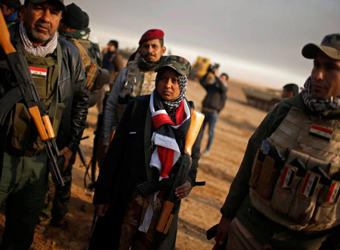Wearing a camouflage cap over her headscarf, Miaad al-Jubbouri cuts an unusual figure among the hundreds of men fighting to retake a village from Islamic State in northern Iraq.
The mother of five was the sole woman among a joint force of Iraqi army and tribal militias who attacked the village of Kanous on Wednesday – one of multiple fronts in a campaign to drive the insurgents from their remaining strongholds in Iraq.
Like the men around her, Jubbouri said her motive for taking up arms was hatred of Islamic State, which overran large parts of the country more than two years ago, meting out brutal punishments and killing its opponents, including several of her cousins.
But unlike them, her mere presence on the battlefield goes against the weight of tradition in a society where women are often confined to the home and seldom seen near the frontlines, except when fleeing.
“These soldiers are all my brothers; I am proud to be with them,” said Jubbouri, to voices of approval from the men standing around her. “They (Islamic State) came to destroy Iraq but we will … burn those dogs.”
Despite the fighting talk, Jubbouri joined the ‘Lions of the Tigris’ tribal militia just 10 days ago and has no prior combat experience.
The militia is one of dozens that have sprung to support Iraqi forces advancing on Mosul – Islamic State’s last major urban stronghold in the country – in a U.S.-backed campaign that began in October and is regarded as crucial to dismantling the caliphate the jihadists declared over parts of Iraq and Syria in 2014.
The men treat her more like a mascot than a sister in arms.
A Kalashnikov is slung across her small frame, but not once did Jubbouri fire it during Wednesday’s battle, and she remained a short distance behind the first line of fire.
“They (the men) don’t let me go to the very front. They fear for me, but I want to go,” said Jubbouri apparently unperturbed by the deafening sound of mortars being fired at Kanous – her hometown.
On the roof of a house further forward, a dozen soldiers and militiamen positioned on a roof fired round after round indiscriminately towards the village, facing only light resistance.
LIKE A WOLF
During the two years she lived there under Islamic State rule, Jubbouri said she secretly informed Iraqi security forces about the militants’ movements, and flouted their order that women veil their faces.
She left Kanous with her family this summer and joined thousands more displaced Iraqis at a camp in the Kurdish region, where her husband was picked up by security services and put in jail.
Jubbouri is not sure why, but said her husband’s name may have been confused with that of a suspect, or that someone bearing a grudge against him may have accused him of links with the militants. “As far as I know he’s done nothing wrong,” she added, the flag of Iraq tied around her neck like a scarf.
After her husband was detained, Jubbouri went south to Tikrit and left her children – aged between one and nine – in the custody of a relative so she was free to join the fight against Islamic State.
“My children cried and said, ‘We are scared you will die’,” Jubbouri said. “I told them I won’t.”
Neither her father nor mother are alive, and Jubbouri did not tell her uncles, who might have objected to her taking up arms. Her mother-in-law however encouraged Jubbouri to go and avenge the death of a son who was killed by insurgents in 2012.
Jubbouri’s husband, who remains in a Kurdish prison, is not aware of his wife’s militia role. “He wouldn’t be satisfied … but he knows I am a wolf, that I am a fighter and that I am like a man,” she said.
Backed by the Iraqi government, the Lions of the Tigris’ ranks are drawn from young local men, many of whom used to be in the army and have lost friends and loved ones to the militants.
The men asked to have their photograph taken beside Jubbouri and said she would be awarded the home of an Islamic State fighter in Kanous after it was liberated.
“It raises the soldiers’ morale to see a woman with them, fighting against terrorism and Daesh,” said 27-year-old fighter Amer Kadhim.
One commander talked about making Jubbouri the head of a female battalion, but the fighters were less enthusiastic about the prospect of their own wives and sisters taking up arms alongside them.
Asked whether he would allow his female relatives to join the battle, Kadhim evaded the question. “We have customs and traditions,” he said.


